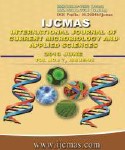


 National Academy of Agricultural Sciences (NAAS)
National Academy of Agricultural Sciences (NAAS)

|
PRINT ISSN : 2319-7692
Online ISSN : 2319-7706 Issues : 12 per year Publisher : Excellent Publishers Email : editorijcmas@gmail.com / submit@ijcmas.com Editor-in-chief: Dr.M.Prakash Index Copernicus ICV 2018: 95.39 NAAS RATING 2020: 5.38 |
Intensive agriculture has been successful owing to its input viz. fertilizers and pesticides along with high yielding varieties. But due to xenobiotic characteristics of pesticides in soil, it may adversely affect the growth of beneficial microorganisms and transformations associated with them. Pesticide contamination is a major concern in current scenario of agriculture. Microorganisms influence important biochemical reactions such as mineralization of organic matter, nitrification, ammonification etc. The impact of pesticides on microbial diversity and enzymatic activities are of significance as bio-transformations play key role in biochemical reactions and degradation of pesticides in soil to maintain soil health. Degradation of pesticides depends on many factors viz. pesticide structure and concentration, temperature, pH and soil moisture etc. Pesticides inhibit or kill certain group of microorganisms by reducing the competition of certain groups; it reduces microbial diversity but increases functional diversity of microbial communities. Inactivation of nitrogen fixing and phosphorus solubilizing microorganisms is observed in pesticide contaminated soils. However, few reports have highlighted some positive effects of pesticides on soil microbial diversity as some microbes are capable of utilizing applied pesticides as a source of energy and nutrients for their growth. Biopesticides are also gaining importance as they can be an alternative to chemical pesticides in sustaining natural environment. Trichoderma has been observed to increase microbial flora and fauna by improving soil aggregation. However, certain bio-pesticides may stimulate shifting of specific microbial population thus changing the microbial community. Negative impact of a microbial biopesticide, paenimyxin produced by Paenibacillus sp. strain B2 was observed on the bacterial population. It is difficult to understand the role of pesticides in disconcerting soil environment due to conflicting research findings available in the literature. Therefore, application of biopesticides along with natural soil amendments (compost, manure, vermicompost etc.) can be an alternative to chemical pesticides without deteriorating the environment but complete removal of chemical pesticides may not be advisable as biopesticides are slow in action.
 |
 |
 |
 |
 |